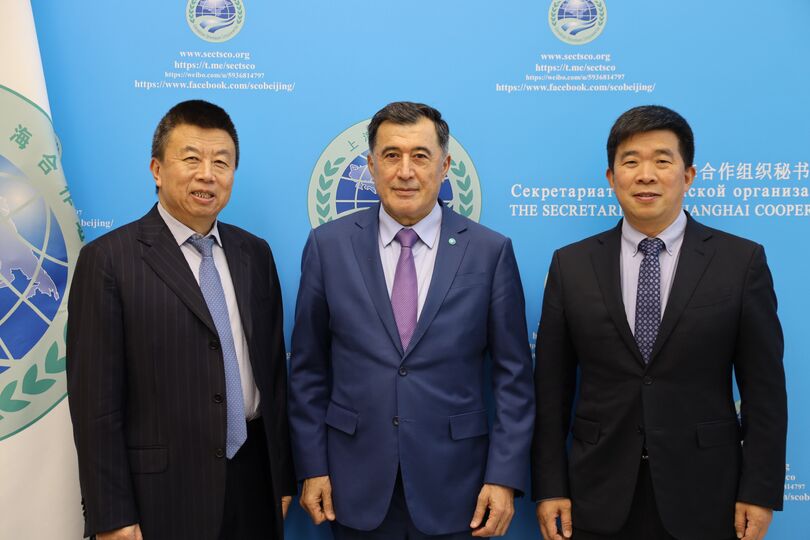On 26 January 2021, SCO Secretary-General Vladimir Norov had a meeting with Secretary-General of China Overseas Development Association (CODA) He Zhenwei and Vice-President of the Kingold Group Zhai Junyin, who is also Secretary-General of Imperial Springs International Forum, at the SCO Secretariat. The officials discussed industrial cooperation within the SCO framework.
Vladimir Norov noted that the SCO was paying high attention to the development of industrial cooperation.
He added that during the recent meetings held by their councils, the SCO heads of state and heads of government emphasised the importance of promoting and further developing financial, investment and industrial collaboration.
He added that during the recent meetings held by their councils, the SCO heads of state and heads of government emphasised the importance of promoting and further developing financial, investment and industrial collaboration.
In particular, the Programme of Multilateral Trade and Economic Cooperation and the 2021-2025 Action Plan for its implementation, which the SCO Council of Heads of Government (prime ministers) approved on 30 November 2020, sealed the member states' agreement to build up interaction in the field of industrial cooperation, attract investors and review opportunities for the implementation of industrial projects, work together and exchange experience in the establishment of industrial parks and trade and investment clusters, as well as in all spheres of mutual interest when it comes to industrial cooperation.
The SCO Secretary-General pointed out that in his address at the SCO Heads of State meeting in 2020, President of Uzbekistan Shavkat Mirziyoyev had proposed adopting a programme to stimulate industrial cooperation between the business communities of the SCO countries.
The SCO countries have redoubled their efforts to implement joint projects at innovation clusters and technology parks based on high and digital technologies. In this context, it is of the utmost importance to boost collaboration and implement practical projects together with leading Chinese companies, including in the Guangdong Province.
Secretary-General of China Overseas Development Association (CODA) He Zhenwei pointed out the importance of implementing industrial cooperation projects between SCO countries and the coordinating role of China's National Development and Reform Commission in this sphere. He also updated those present on the results of China's industrial collaboration with the SCO countries.
Zhai Junyin outlined the activities of the Kingold Group, which Chairman Chau Chak Wing created in the early 1990s. The company is headquartered in Guangzhou, the administrative centre of the Guangdong Province, and is operating in many spheres, including finance, healthcare, education and also the hotel business.
The Kingold Group employs about 10,000 people. In 2014, it joined forces with the Australia China Friendship and Exchange Association (ACFEA), the Chinese People's Association for Friendship with Foreign Countries (CPAFFC) and other organisations to launch the Imperial Springs International Forum, which is attended by former foreign heads of state and government.
Zhai Junyin proposed strengthening industrial cooperation within the framework of the SCO, including based on the advantages of the Kingold Group and other Guangdong companies. Plans for future collaboration and joint events were also a topic of discussion.
Guangzhou is a large trade and industrial centre of the Guangdong Province. The industrial facilities located in its environs turn out 25 percent of Chinese products. The Guangzhou Nansha Economic and Technological Development Zone located in southern Guangzhou houses the headquarters of large global producers from the Fortune 500 list, including automobile, mechanical engineering, metallurgical, chemical and IT companies.
The Guangdong Province is a major financial centre. It houses the Shenzhen Stock Exchange and large insurance, banking, finance and high-tech companies. An IT corridor comprising Shenzhen, Guangzhou, Dongguan, Huizhou, Foshan and Zhongshan is located in the Zhujiang River (Pearl River) Delta Metropolitan Region. Local companies are working successfully in the field of industrial automation. They produce around 20 percent of industrial robots made in China.
Guangdong accounts for 10 percent of China's industrial facilities and a large share of Chinese exports. There are plans to turn the Greater Bay Area, which includes Hong Kong, Macao and nine Guangdong cities, into a global centre of technology innovation with advanced manufacturing and modern services industries by 2035.
